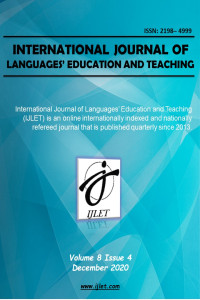Öz
Kaynakça
- Aktaş, T. ; İşigüzel, B. (2014). Yabancı Dil Öğretiminde Yapılandırmacı Kuram. Nevşehir Hacı Bektaş Veli Üniversitesi Sosyal Bilimler Enstitüsü Dergisi 3, 128-145.
- Brown, F. Apprentissage par investigation - Green Teacher traduit par Mariela Valdez, https://greenteacher.com/article%20files/apprentissageparinvestigation.pdf. Date d'accès au site: 02.06.2020.
- Bybee, R. W. Taylor, J. A., Gardner, A., Scotter, P. V., Powell, J. C., Westbrook, A., Landes, N. (2006). The BSCS 5E Instructional Model: Origins, Effectiveness, and Applications. Colerado: Colerado Springs.
- Capelle, G. Menand, R.(2009). Le Noveau Taxi ! 1. Livre de l’élève A1. Hachette Livre, Paris, France.
- Conseil de l’Europe.(2001).Cadre Européen Commun de Référence Pour les Langues. Paris: Les Éditions Didier.
Öz
Le constructivisme cognitif explique, chez l’individu la construction des connaissances et le déroulement de l’apprentissage par
le moyen des concepts d'assimilation et d’accommodation de Piaget. L’assimilation veut dire que des connaissances antérieures
et les stimulations de l’environnement sont analogues, alors il s’agit de l'augmentation des structures cognitives similaires de
l’individu. Néanmoins, l’accommodation est la modification des schèmes déjà acquis ; c’est-à-dire, quand il s’agit d’une phase
d’un déséquilibre cognitif entre les schèmes préexistants et le milieu extérieur, l’individu réorganise sa propre structure selon le
contexte et donc, il apprend et construit ses propres connaissances. Dans ce contexte, le cycle d'apprentissage 5E, basé sur la
théorie du constructivisme cognitif est l'un des modèles développés pour l'environnement de l'enseignement/de l'apprentissage
constructiviste. Le cycle d'apprentissage 5E est utilisé pour faire acquérir un ou plusieurs concepts aux apprenants. Il consiste en
cinq phases : l’engagement, l'exploration, l'explication et l'élaboration et l'évaluation. À cette fin, dans notre étude, après avoir
examiné en détail le constructivisme cognitif, la place et l'importance du cycle d'apprentissage 5E dans
l'enseignement/l’apprentissage du français langue étrangère (FLE) seront discutées. À la fin de l’étude, nous visons à présenter
une fiche pédagogique préparée selon les principes du cycle en question.
Anahtar Kelimeler
Le constructivisme cognitif l’adaptation l’assimilation l’accommodation le cycle d’apprentissage 5E FLE.
Kaynakça
- Aktaş, T. ; İşigüzel, B. (2014). Yabancı Dil Öğretiminde Yapılandırmacı Kuram. Nevşehir Hacı Bektaş Veli Üniversitesi Sosyal Bilimler Enstitüsü Dergisi 3, 128-145.
- Brown, F. Apprentissage par investigation - Green Teacher traduit par Mariela Valdez, https://greenteacher.com/article%20files/apprentissageparinvestigation.pdf. Date d'accès au site: 02.06.2020.
- Bybee, R. W. Taylor, J. A., Gardner, A., Scotter, P. V., Powell, J. C., Westbrook, A., Landes, N. (2006). The BSCS 5E Instructional Model: Origins, Effectiveness, and Applications. Colerado: Colerado Springs.
- Capelle, G. Menand, R.(2009). Le Noveau Taxi ! 1. Livre de l’élève A1. Hachette Livre, Paris, France.
- Conseil de l’Europe.(2001).Cadre Européen Commun de Référence Pour les Langues. Paris: Les Éditions Didier.
Öz
Cognitive constructivism explains, in the individual, the construction of knowledge and the course of learning by means of the
concepts of assimilation and accommodation of Piaget. Assimilation means that prior knowledge and environmental stimuli are
analogous, then it is about increasing the similar cognitive structures of the individual. Nevertheless, accommodation is the
modification of patterns already acquired; that is to say, when it is a question of a phase of a cognitive imbalance between the preexisting schemes and the external environment, the individual reorganizes his own structure according to the context and
therefore, he learns and builds his own knowledge. In this context, the 5E learning cycle, based on the theory of cognitive
constructivism is one of the models developed for the constructivist teaching / learning environment. The 5E learning cycle is
used to help learners acquire one or more concepts. It consists of the five phases: engagement, exploration, explanation, and
elaboration and evaluation. To this end, in our study, after examining in detail the cognitive constructivism; the place and
importance of the 5E learning cycle in the teaching / learning of French as a foreign language (FLE) will be discussed. At the end
of the study, we aim to present an educational sheet prepared according to the principles of the cycle in question
Anahtar Kelimeler
Cognitive constructivism adaptation assimilation accommodation the learning cycle 5E FLE.
Kaynakça
- Aktaş, T. ; İşigüzel, B. (2014). Yabancı Dil Öğretiminde Yapılandırmacı Kuram. Nevşehir Hacı Bektaş Veli Üniversitesi Sosyal Bilimler Enstitüsü Dergisi 3, 128-145.
- Brown, F. Apprentissage par investigation - Green Teacher traduit par Mariela Valdez, https://greenteacher.com/article%20files/apprentissageparinvestigation.pdf. Date d'accès au site: 02.06.2020.
- Bybee, R. W. Taylor, J. A., Gardner, A., Scotter, P. V., Powell, J. C., Westbrook, A., Landes, N. (2006). The BSCS 5E Instructional Model: Origins, Effectiveness, and Applications. Colerado: Colerado Springs.
- Capelle, G. Menand, R.(2009). Le Noveau Taxi ! 1. Livre de l’élève A1. Hachette Livre, Paris, France.
- Conseil de l’Europe.(2001).Cadre Européen Commun de Référence Pour les Langues. Paris: Les Éditions Didier.
Ayrıntılar
| Birincil Dil | Fransızca |
|---|---|
| Konular | Dil Çalışmaları (Diğer) |
| Bölüm | Araştırma Makalesi |
| Yazarlar | |
| Yayımlanma Tarihi | 30 Aralık 2020 |
| Yayımlandığı Sayı | Yıl 2020 Cilt: 8 Sayı: 4 |


